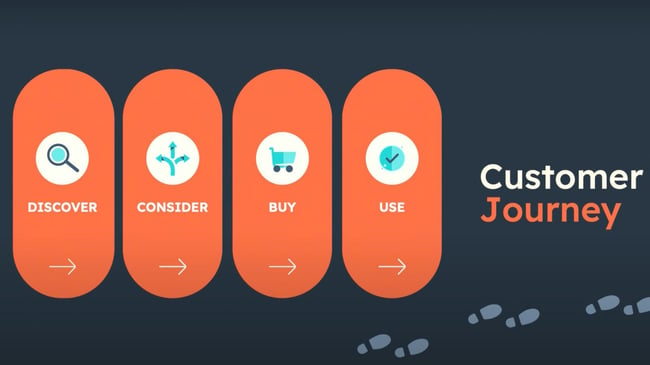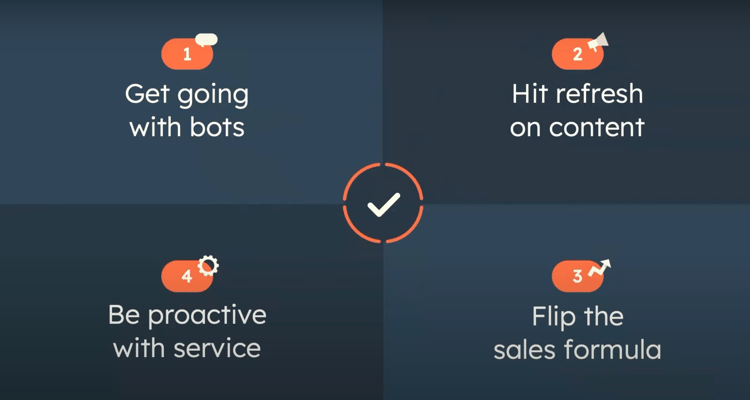I had the incredible opportunity to attend HubSpot's Inbound Conference, and I'll tell anyone that it's an event like no other. The conference was held at the Boston Convention and Exhibition Center, and it's the place to be for marketers, sales professionals, entrepreneurs, and anyone looking to stay at the forefront of industry trends and strategies.
What makes INBOUND truly special is its ability to unite a diverse community of professionals under one roof. The event is not just about sitting through sessions and taking notes; it's an immersive experience that connects you with like-minded individuals, industry leaders, and the latest tools and technologies.
Every year, INBOUND delivers a powerhouse lineup of speakers; this year was no exception. We had the chance to hear from thought leaders, innovators, and experts who shared their insights, experiences, and visions for the future of marketing, sales, and customer success.
The information shared had practical tips and real-world case studies to dive deep into the latest technological advancements, especially in AI. But what sets INBOUND apart is not just the content; the atmosphere of inspiration, collaboration, and networking fills every corner of the event.
In this blog, I'll summarise HubSpot's CEO Yamani Rangan's opening presentation and break down some of her salient points.
Yamini began her talk by acknowledging the significance of AI in today's world. Still, she emphasised that she had something even more significant to discuss: Change. She explained how AI has considerably impacted our lives and work in the past year, with advancements like ChatGPT, Bard, and LLaMa pushing the boundaries of generative AI. According to Yamini, the speed of change in the technology landscape has been unprecedented, making the present moment of business and the customer unique.

The central theme of her talk revolved around the transformative power of generative AI. She demystified AI, highlighting that while predictive AI has been around for decades, generative AI is a game-changer. Generative AI can create new use cases and scope for professionals and entrepreneurs looking at growing and developing their businesses. This shift, she argued, is moving us from the age of information to the age of intelligence.
Yamini urged the audience to focus on the core of AI: Intelligence. The fundamental shift happening with AI is moving from acquiring information to acting on intelligence. For marketing, sales, and customer success professionals, the key to leveraging this intelligence is fostering better customer relationships or connections.
The core message was clear: Customer connection drives growth. Data-backed research at HubSpot found that companies focusing on customer connection experienced five times more growth than average. Moreover, those who consistently connected at every stage of the customer journey saw 19% more growth. In other words, meaningful engagement with customers throughout their buying experience is an excellent business practice.


The transition from acquiring information to acting on intelligence in the age of AI means that companies need to understand and adapt to evolving customer expectations. Yamini walked us through what HubSpot believes is the new customer journey and what they means for the customer at each stage.

Those stages were:
- The Discover Stage: Customers now discover products primarily through social media, with 44% of business buyers using social to find new products/services. Businesses should focus on engaging customers on platforms like TikTok, Instagram, and YouTube to provide engaging and relevant content.
- The Consider Stage: Customers prefer conversations over clicks when seeking more information about a product. Businesses should facilitate one-on-one conversations and provide personalised information instead of forcing customers to sift through information on their own.
- The Buy Stage: Customers expect personal insights during sales interactions, not just templated personalisation. Businesses should leverage AI to provide deep insights and personalised customer recommendations during sales interactions.
- The Use Stage: Proactive assistance is vital, with customers wanting personalised insights rather than reactive help. Businesses should use AI and CRM data to anticipate customer needs and provide insights that enhance the customer experience.
What stood out to me at this stage of Yamini's talk was that the customer journey is evolving rapidly, and businesses need to adapt accordingly. To do this, companies must be more proactive in understanding and addressing changing customer expectations in each stage of the journey.

How can business go about doing this?
Well, she gave some practical advice on how and where companies should start navigating this evolving business landscape, and some of these tips were;
- Start with Bots: Implement AI-powered chatbots for your website to engage customers effectively. These chatbots can answer customer questions, provide product information, and improve customer engagement.
- Refresh Content with AI: Optimise your content strategy by creating content that caters to AI and distribute it across various channels.
- Flip the Sales Formula: The old formula of hiring more sales reps and relying on a high volume of activities is no longer effective. Instead, businesses should focus on efficiency by using AI to assist sales reps, enabling them to engage more effectively with customers.
- Be Proactive with Service: Businesses should transition from reactive customer support to proactive assistance. AI can provide insights and suggestions to address customer needs before they even ask, leading to a more delightful customer experience.
- Embrace AI Across Operations: Businesses should integrate AI into their operations. AI should not be limited to one department; it should be leveraged for marketing, sales, and customer service to drive growth and customer connection.
- Start Small and Iterate: Yamini advised businesses to start small with AI initiatives, iterate quickly, and learn from customer feedback. There is no playbook for AI, so experimentation and adaptation are crucial to success.
Yamini's Closing Comments
Yamini closed her talk with a look at HubSpot's vision for the future. Her message was loud and clear: it's crucial to embrace AI, prioritise customer relationships, and be ready to adapt to the ever-changing business landscape to achieve growth in the era of intelligence. The future holds great potential, and HubSpot is leading this transformative journey.




COMMENTS